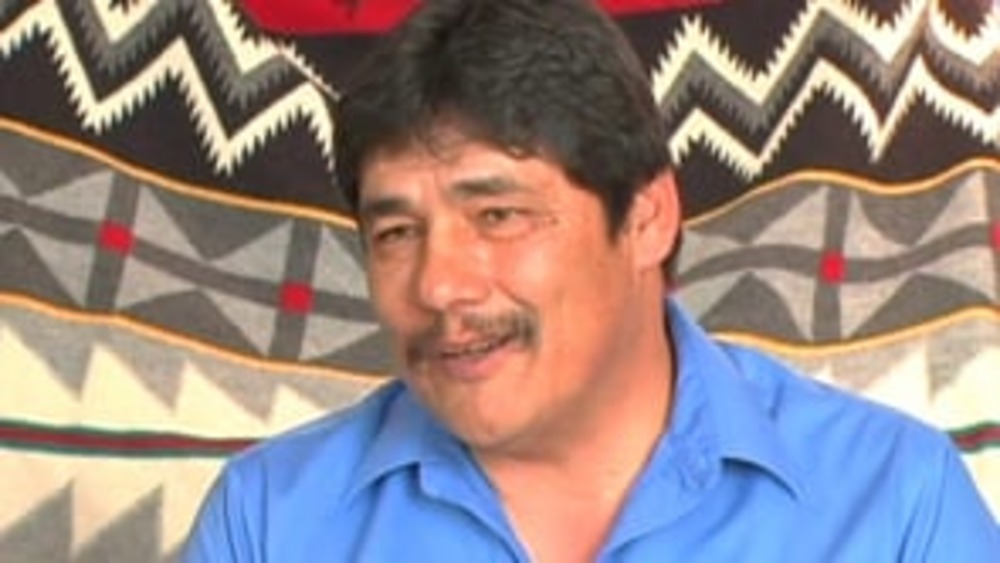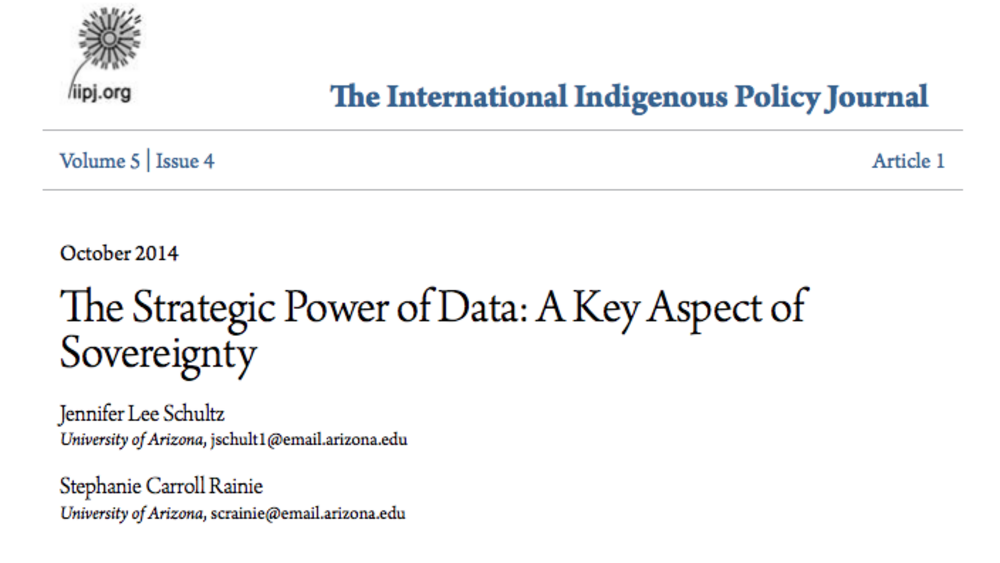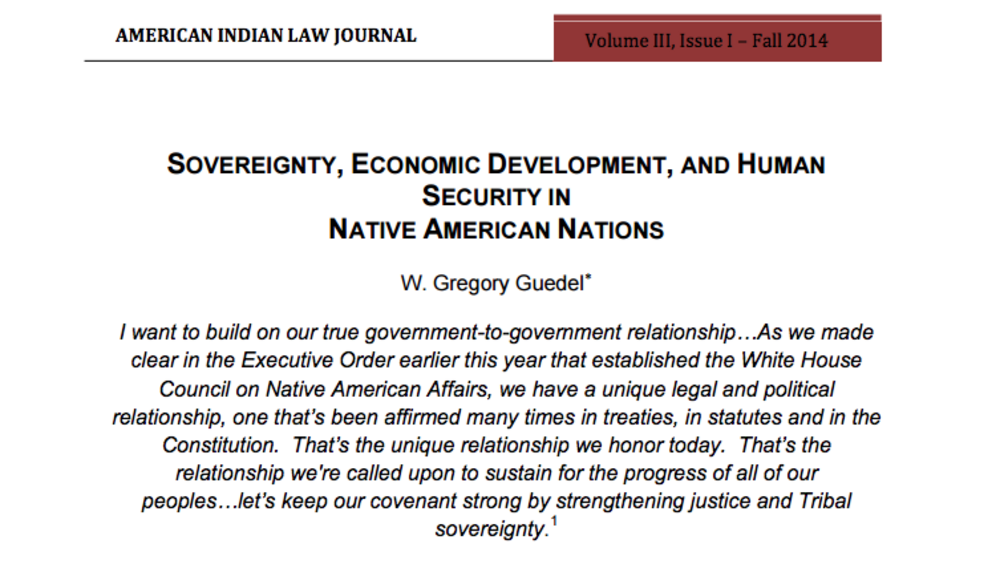Native leaders offer their definitions of what sovereignty is and what it means for Native nations in the 21st century.
Additional Information
Barrett, John "Rocky". Native Nations Institute for Leadership, Management, and Policy, University of Arizona. Tucson, Arizona. March 28, 2009. Interview.
Fullmer, Jamie. Native Nations Institute for Leadership, Management, and Policy, University of Arizona. Tucson, Arizona. June 17, 2008. Interview.
Harjo, Suzan. Native Nations Institute for Leadership, Management, and Policy, University of Arizona. Tucson, Arizona. September 11, 2008. Interview.
Jourdain, Floyd "Buck." Native Nations Institute for Leadership, Management, and Policy, University of Arizona. Red Lake, Minnesota. July 2008. Interview.
Mankiller, Wilma. Native Nations Institute for Leadership, Management, and Policy, University of Arizona. Tucson, Arizona. September 29, 2008. Interview.
Ninham-Hoeft, Patricia. Native Nations Institute for Leadership, Management, and Policy, University of Arizona. Tucson, Arizona. March 26, 2009. Interview.
Pierre, Sophie. Native Nations Institute for Leadership, Management, and Policy, University of Arizona. Phoenix, Arizona. October 21, 2008. Interview.
Pierre, Sophie. "What I Wish I Knew Before I Took Office." Emerging Leaders Seminar. Native Nations Institute for Leadership, Management, and Policy, University of Arizona. Tucson, Arizona. March 25, 2008. Presentation.
Transcript
Sophie Pierre:
"We have a choice! We have a choice. We can continue to go down that self-pitying kind of road, blaming everybody else for our problems, or we can take control of it. We chose to take control of it."
Wilma Mankiller:
"The definition of sovereignty is to have control over your own lands, and resources, and assets, and to have control over your own vision for the future, and to be able to absolutely determine your own destiny."
Jamie Fullmer:
"Sovereignty is an unwritten rule. It's there. You express it by what you do to grow and, within that though, what you claim is based on the structures that you develop. So, in the modern sense, as the nation moves forward, the process and the ideal of sovereignty is: we are here; we express ourselves; we accept the challenge and responsibility of governing and seeing our own path forward."
Suzan Harjo:
"Sovereignty is the act of sovereignty. We, as Native nations, are inherently sovereign and whatever we do to act sovereign is the definition of sovereignty. When something is inherent, it's inherent. You are who you are from the inside out and it's not something that is over-layered, either in law or in policy, and it's not something that the Europeans brought from Europe. It is your language -- speaking your language is an act of sovereignty."
John "Rocky" Barrett:
"A government without law, and the willingness to enforce that law, isn't really a government. That's the ultimate act of sovereignty -- not only enforcing a law, but being willing, as a people, to put themselves under the rule of law, is the ultimate act of sovereignty."
Floyd Jourdain:
"With tribal sovereignty, a lot of the time you see in the media, you see in the public, the term sovereignty come when tribes are on a defensive. We shouldn't have to protect our tribal sovereignty. We should be out there using our tribal sovereignty in a good way to advance our interests, to bring more resources to our communities, and not wait around until every two and four years (when the state and the federal elections come along) and all of a sudden we have to defend ourselves against interest groups, against sporting organizations, and those types of things. No, we need to use our tribal sovereignty in a good way -- proactively -- to use it to advance the interest of our tribal nations."
Patricia Ninham-Hoeft:
"I think too often people think sovereignty is when you can pound on your chest and proclaim that the things that you are doing are because you can do it, because you're a sovereign. But in today's world we have so many different relationships and so many different communities that we interact with that we don't live in isolation anymore. We have to work together, we're interdependent with places -- not just in our own backyard but around the globe -- so sovereignty, if you exercise it effectively, starts with understanding that it's a tool to building a community. It's not the end result. Because I hear that so often from tribal leaders: 'The goal for our tribe is to make sure that our sovereignty is strong.' And I think, 'that's not the end result. The end result is, how do you use your sovereignty to build a strong community?'"
Jamie Fullmer:
"Sovereignty, I believe, is best expressed when we ask not what we can do, but why can't we do it? The question we can ask is: why can't we do it? We're not asking: can we do that? We're asking: why can't we do that? You know, have others prove us wrong and not have to prove ourselves wrong first."
Sophie Pierre:
"I think what it really means was explained by a chief who has since left us. His name was Joe Mathias. He was chief of Suquamish. And he always said that exercising sovereignty was that, "˜the people who were going to live with the results of a decision, are the people who make the decision.' And to me, that's what sovereignty has always meant. We are responsible for our own lives, we make our own decisions, and we're the people that suffer the consequences of those decisions."



